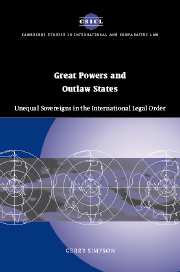Book contents
- Frontmatter
- Contents
- Foreword
- Preface
- Acknowledgements
- List of abbreviations
- Part I Introduction
- Part II Concepts
- Part III Histories: Great Powers
- 4 Legalised hegemony: from Congress to Conference 1815–1906
- 5 ‘Extreme equality’: Rupture at the Second Hague Peace Conference 1907
- 6 The Great Powers, sovereign equality and the making of the United Nations Charter: San Francisco 1945
- 7 Holy Alliances: Verona 1822 and Kosovo 1999
- Part IV Histories: Outlaw States
- Part V Conclusion
- Select bibliography
- Index
6 - The Great Powers, sovereign equality and the making of the United Nations Charter: San Francisco 1945
Published online by Cambridge University Press: 05 July 2009
- Frontmatter
- Contents
- Foreword
- Preface
- Acknowledgements
- List of abbreviations
- Part I Introduction
- Part II Concepts
- Part III Histories: Great Powers
- 4 Legalised hegemony: from Congress to Conference 1815–1906
- 5 ‘Extreme equality’: Rupture at the Second Hague Peace Conference 1907
- 6 The Great Powers, sovereign equality and the making of the United Nations Charter: San Francisco 1945
- 7 Holy Alliances: Verona 1822 and Kosovo 1999
- Part IV Histories: Outlaw States
- Part V Conclusion
- Select bibliography
- Index
Summary
Introduction
Much of this book concerns the intersection of law and power. I have used a familiar but neglected principle of international law, that of sovereign equality, to investigate some dilemmas of international legal and political order. As I demonstrated in Chapter 2, the principle of sovereign equality is associated with the notion that states are formally equal or are entitled to some sort of equality under or before or in the creation of the law. I juxtapose against this principle of international order two images of the state that are just as familiar to international lawyers but, perhaps, are under-theorised by them. These are, respectively, the image of the ‘Great Power’ and the portrayal of some states as outlaw states or criminal states. This chapter continues an analysis begun in Chapters 4 and 5 of the legalised hegemony of the Great Powers. In this chapter, I consider the efforts made at San Francisco to construct an international organisation that reconciled the requirements of the Great Powers for legalised hegemony and the demands of the middle and smaller powers for some form of sovereign equality.
This is not a political history of the United Nations nor an investigation into its working practices. Instead, this chapter has the more modest goal of showing how the practice of legalised hegemony was given legitimacy at San Francisco despite the reluctance and anxieties of the weaker powers.
- Type
- Chapter
- Information
- Great Powers and Outlaw StatesUnequal Sovereigns in the International Legal Order, pp. 165 - 193Publisher: Cambridge University PressPrint publication year: 2004



